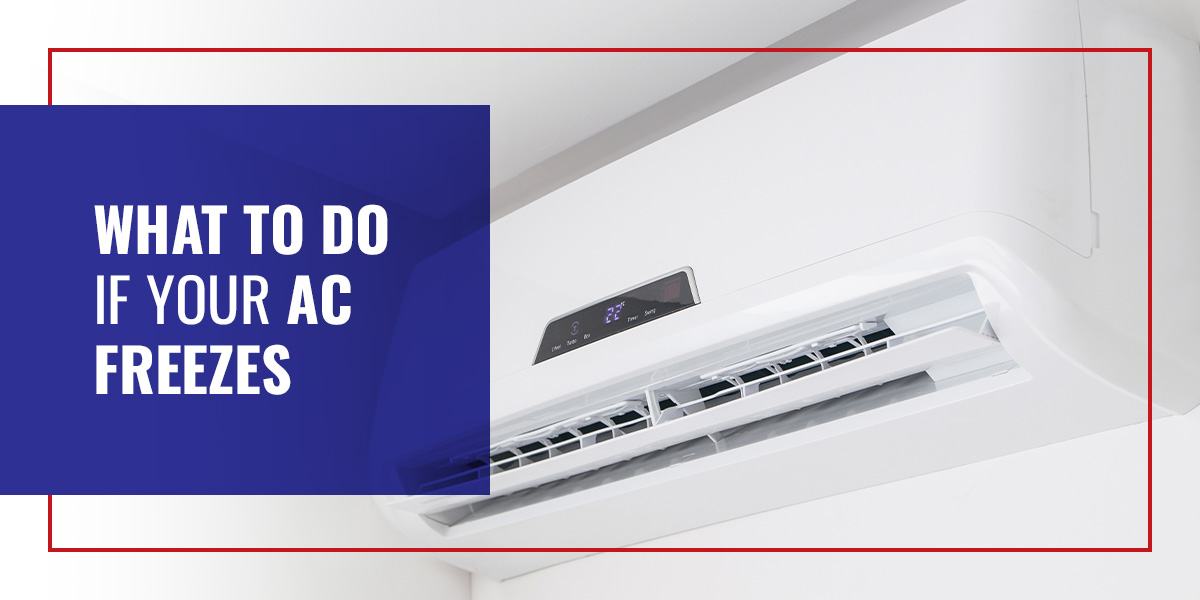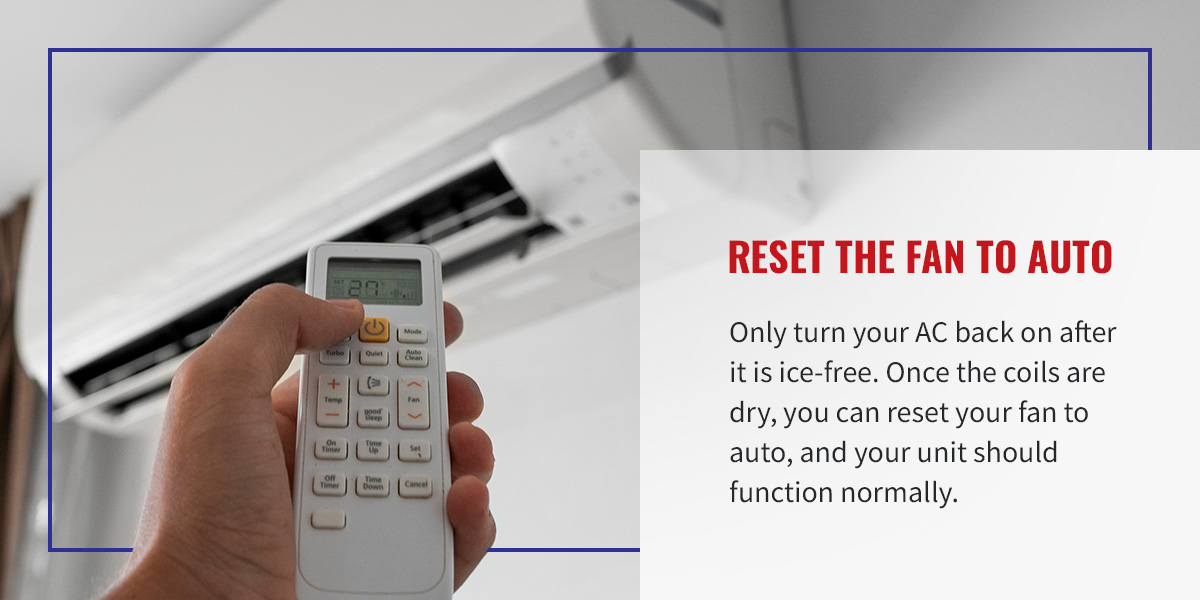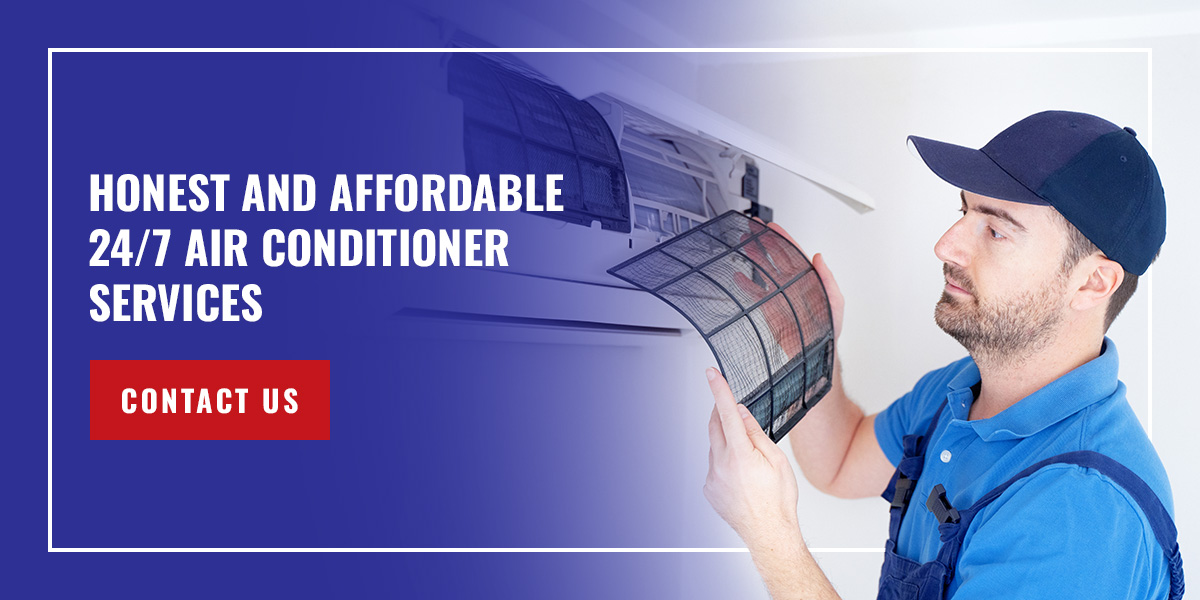What to Do If Your AC Freezes

Many people assume that an air conditioner runs best at a cool temperature. However, when the temperature around or inside your AC unit drops too low, it can cause maintenance issues. You may be surprised to learn that an AC unit can freeze in the middle of the summer.
Cold air can lead to a frozen evaporator coil within your system. As a result, your AC may struggle to operate or stop working altogether. Learn the potential reasons your AC is freezing up, how to unfreeze it and tips for preventing this problem from happening again.
At What Temperature Does an AC Freeze?
An AC unit can freeze when temperatures drop below 60 degrees. Air conditioning units work through a controlled temperature, airflow and pressure. If these elements fall out of balance, the refrigerant system that creates cold air can freeze by running too fast without actually making your air colder.
But how does this happen? When refrigerant moves through your AC’s evaporator coils, it reaches low temperatures. During normal operation, the warmth in your home prevents ice or frost by passing warm unconditioned air over the coils. However, if there’s a lack of warm air moving across the evaporator coils, they can ice over, and ice could even form in the refrigerant lines. When humid air meets the coils and condenses, it can freeze even faster.
A frozen AC might blow out warm air or nothing at all. That’s why it’s essential to learn how to prevent this from happening and how to unfreeze your AC unit if it does.
How to Know if Your AC Is Frozen
The obvious sign of a frozen AC unit is ice on your refrigerant line-set pipe. You can determine this by checking between your outdoor unit and your home’s exterior wall to see whether the line is frozen.
You might also have a frozen evaporator coil, which is not as easy to check. In this case, it’s always best to call an HVAC professional who can safely inspect the coil and get your AC running without damaging the system.
Other less apparent signs your AC is frozen include the following:
- Your AC is not sending cool air back into your house.
- Condensation has formed on your indoor unit’s surface.
- Condensation has formed on the exterior of the condensate drain.
It’s not normal for your AC to freeze on a hot day. Fortunately, if this occurs, you may be able to solve the problem with some troubleshooting.
How to Unfreeze an AC Unit
While professional AC technicians can get to the root of your unit’s problem, there are some maintenance issues you can troubleshoot yourself.
Avoid using your AC while the evaporator coils are frozen. Using the AC with frozen evaporator coils puts a strain on the compressor. The AC compressor is the most expensive component in your AC unit, so straining it may damage this valuable part and cause unplanned expenses. Also, avoid breaking up any ice with a heavy object or sharp tool as this can also damage the AC.
Here are some simple steps you can follow at home if you suspect your air conditioner may be frozen:
1. Turn off Your AC
As soon as you suspect your AC is frozen, shut it off immediately. Most people only turn off the control panel and thermostat, but you should also turn off the AC from the electrical breaker to stop all AC activity and help the evaporator coils warm up and melt the ice.
2. Thaw It Out
After you turn the AC unit off, it might take an entire day for the ice to thaw completely. It might be best to spend time elsewhere, especially if the forecast is particularly hot. Of course, be mindful of pets in your home and the temperature forecast. If it’s not practical for you to turn the AC off completely, you can leave the blower running instead.
3. Turn the Fan On
Change the fan setting on your AC from “auto” to “on.” Set your thermostat to run only the blower or fan, which can allow the air to circulate around the coils to thaw them faster.
Defrosting is a simple process that may resolve the issue of a frozen air conditioner. Be patient and avoid turning it back on before the ice has completely thawed. Thawing out your AC before a technician arrives allows them to perform a diagnostic check to determine the problem with your unit.
4. Reset the Fan to Auto
Only turn your AC back on after it is ice-free. Once the coils are dry, you can reset your fan to auto, and your unit should function normally. However, you should also take preventive steps to ensure your AC won’t freeze up again in the future.
You should also keep track of any water leakage that may have occurred while thawing your system. Doing so can help you avoid interior damage to your home. It can also prevent leftover water droplets left in the unit from freezing again later on.
Reasons Your AC Is Freezing Up
When your AC freezes up, it comes down to one problem — the airflow is constricted. If you don’t have enough warm air blowing over the evaporator coils to transfer heat, the refrigerant will not turn to warm gas. Instead, the refrigerant will freeze in the coil or the line-set pipe.
While poor airflow is the root of the problem, it could have several causes. These are the most common reasons for compromised airflow that can cause a frozen air conditioner.
1. Clogged Air Filters
Air conditioners require a constant airflow to ensure humidity cannot settle on the coils and freeze. As your air filters accumulate dirt over time, they can block the flow of your warm indoor air. Furniture or curtains can block off return vents and restrict airflow, which can cause a frozen AC.
Ensure your filters are clean to keep the airflow in your home moving while avoiding disrupting your AC’s functionality. Replace your filters often and ensure you aren’t blocking or closing your supply and return vents. Maintenance check-ups can also prevent airflow problems to help you avoid a frozen AC.
2. Clogged Condensate Lines
The condensate lines are the component within your HVAC system that drains excess moisture from the system. If the pipe is clogged, the water can become stuck and freeze. With frozen water in your lines, you could also be left with frozen coils.
One way to determine a clogged pipe is if water is leaking around your AC unit. Another possible sign is water stains on the ceiling. Dirty water, mold or a lack of cleaning can all block the condensate drain line.
3. Damaged Blower Fan
The blower fan is responsible for pushing warm air to the coils. When the fans are malfunctioning or not blowing enough warm air, the coils can freeze and prevent the AC from working.
4. Dirty Coil
The air within your home travels into your AC ducts, carrying dust and other debris. Your filter helps capture most of it but may not get everything. Over time, your AC’s evaporator coils may clog up with dust, grime or hair. When moisture is trapped within the clogged coil, it can freeze and cause the coils to freeze as well, restricting airflow. This may cause your system to struggle to work or malfunction altogether.
Schedule regular maintenance check-ups by a professional who can prevent your coil from getting too dirty.
5. Low Refrigerant Level
A coolant leak causes low refrigerant levels, which can pressurize the system and leave your AC line frozen. Signs you may have a coolant leak include your AC blowing hot air or making a hissing sound. Since coolant chemicals can be toxic, leave handling them to a professional.
6. Collapsed Air Ducts
The air ducts are responsible for passing air through your AC system. When an air duct collapses, it can block airflow and lead to your AC freezing up, among other problems. This collapse can happen for several reasons, but the primary cause is old age.
How to Prevent a Frozen AC Unit
To prevent a frozen air conditioner and ensure your unit runs smoothly throughout the warmer months, follow these steps:
1. Change Your Air Filter
A dirty air filter is one of the leading causes of a frozen HVAC system. As your air filter cleans the circulated air in your home, it can clog up with pollen, dirt, dust and other allergens. A clog can restrict the airflow and eventually freeze the HVAC coils.
Regularly checking and changing your air filter can help you avoid a frozen air conditioner. Change your air filter quarterly or more often to maintain good airflow. You should replace your air filters monthly if:
- You use your AC more than half the year.
- You have pets. Airborne pet dander circulates just like typical dust through your house.
- You have a large household or frequent guests. More people and more activity mean more dirt, debris and dust.
- Someone in your household smokes indoors.
- Your area experiences wildfires. Airborne ash outside can easily make its way inside.
- You use a wood stove or fireplace.
- Your area is windy or susceptible to high winds.
- You live in a high-pollen count area.
- Your property is a farm or ranch. Outdoor activity or animals can kick up dirt and dust that easily gets inside.
- Someone in your household has allergies, asthma or another respiratory condition or congestive heart condition.
Keeping your air filters clean can also lower your air conditioner’s energy consumption by 5% to 15%. Professionals can change your air filters during a regular maintenance check-up.
2. Schedule Regular Maintenance
Scheduling regular AC maintenance services is one of the best ways to maximize your unit’s life span while reducing the need for repairs. Before the summer hits, you’ll want to have your AC serviced to ensure your system works properly to keep you and your family comfortable. Aim to have your AC serviced every year in early to mid-spring. This way, you can ensure your AC is ready for warmer temperatures.
As part of a seasonal tune-up, professional HVAC contractors will perform a comprehensive inspection. This includes checking coolant levels and charging the system if necessary. A professional can also check your coolant levels with measuring instruments while replacing your air filters. This way, your system can function smoothly while saving you money on energy costs.
3. Get an Airflow Inspection
Obstructed airflow is another primary reason heating and cooling systems malfunction or quit working efficiently. Similar to a clogged filter, a blocked vent prevents adequate airflow. As a result, your system works harder without a proper way to release cooled or heated air.
Ensure your vents and registers are clear from any obstructions. You might also want to check with professionals to ensure your ductwork wasn’t poorly designed or installed. In some cases, the ductwork may be installed correctly but be the wrong size for your house or the capacity.
Professionals can inspect your ductwork, offer redesign solutions if necessary and ensure obstructions are cleared to allow proper airflow. You’ll save time and money and avoid AC repairs or a frozen system in the future with routine AC service.
4. Clean Evaporator Coils
After thawing a frozen AC unit, cleaning a dirty evaporator coil is essential. While AC units vary, most models allow homeowners to inspect their coils by opening the front panel. However, since the coil is within the internal unit of your AC, it can sometimes be challenging to access and clean. For this reason, it’s best to have an HVAC professional handle the job, as they have the tools and expertise to perform the task safely and correctly.
Cleaning dirty coils may prevent your AC unit from freezing again. You might also avoid dirty evaporator coils by changing your air filter regularly and vacuuming dust or pet hair around the vents. Clearing the coils of dust, grime or hair can help you avoid extensive damage and lower your utility bills.
Honest and Affordable 24/7 Air Conditioner Services
We rely on our air conditioning to provide cool air on the warmest days. But when airflow is restricted and the system freezes, it can significantly impact our lives. Leaving the problem untreated can lead to extensive, costly repairs. By staying proactive and scheduling regular maintenance repairs, you can ensure your AC works when you need it most.
Metro Services HVAC is proud to provide 24/7 AC and heating repair services to help get to the root of the problem. Our expertly trained technicians can get to your home quickly to provide high-quality services and repairs. We also offer routine maintenance check-ups to ensure your HVAC functions properly and your home stays comfortable at all times of the year. No matter the issue, you can count on Metro Services to help you in a timely, cost-effective way.
To schedule AC services, contact us today!


